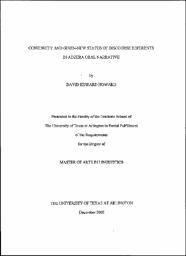
ATTENTION: The works hosted here are being migrated to a new repository that will consolidate resources, improve discoverability, and better show UTA's research impact on the global community. We will update authors as the migration progresses. Please see MavMatrix for more information.
Show simple item record
| dc.contributor.author | Howard, David Edward | |
| dc.date.accessioned | 2020-10-07T21:01:29Z | |
| dc.date.available | 2020-10-07T21:01:29Z | |
| dc.date.issued | 2002-12 | |
| dc.identifier.uri | http://hdl.handle.net/10106/29476 | |
| dc.description.abstract | This thesis analyzes the encoding of discourse referents in oral narratives in Adzera, an SVO Austronesian language of Papua New Guinea. First, it classifies overt referents on a given-new continuum according to Prince's (1981) taxonomy of assumed familiarity, looking at the forms and positions used to introduce new entities into a discourse. Then it applies Givón's (1983, 1995) quantitative approach to measure the continuity of referents, whether overtly manifested or semantically implied as verb arguments. This study largely confirms the findings and predictions of Prince and Givón regarding the introduction of new information and the relative continuity of various forms of reference and grammatical positions. Zero anaphora encode the majority of highly accessible subjects that would be encoded by pronouns in English, even though Adzera has no subject-verb agreement. Of particular interest are instances of first mention by pronominal forms, which appear to function in place of a passive construction, which Adzera lacks. | en_US |
| dc.language.iso | en_US | en_US |
| dc.publisher | University of Texas at Arlington | en_US |
| dc.subject | Language | |
| dc.subject | Literature and linguistics | |
| dc.subject | Papua New Guinea | |
| dc.title | CONTINUITY AND GIVEN-NEW STATUS OF DISCOURSE REFERENTS IN ADZERA ORAL NARRATIVE | en_US |
| dc.type | Thesis | en_US |
| thesis.degree.department | Linguistics | |
| thesis.degree.name | Masters of Arts in Linguistics | |
Files in this item
- Name:
- Continuity and Given-New Status ...
- Size:
- 7.062Mb
- Format:
- PDF
- Description:
- PDF
This item appears in the following Collection(s)
Show simple item record


